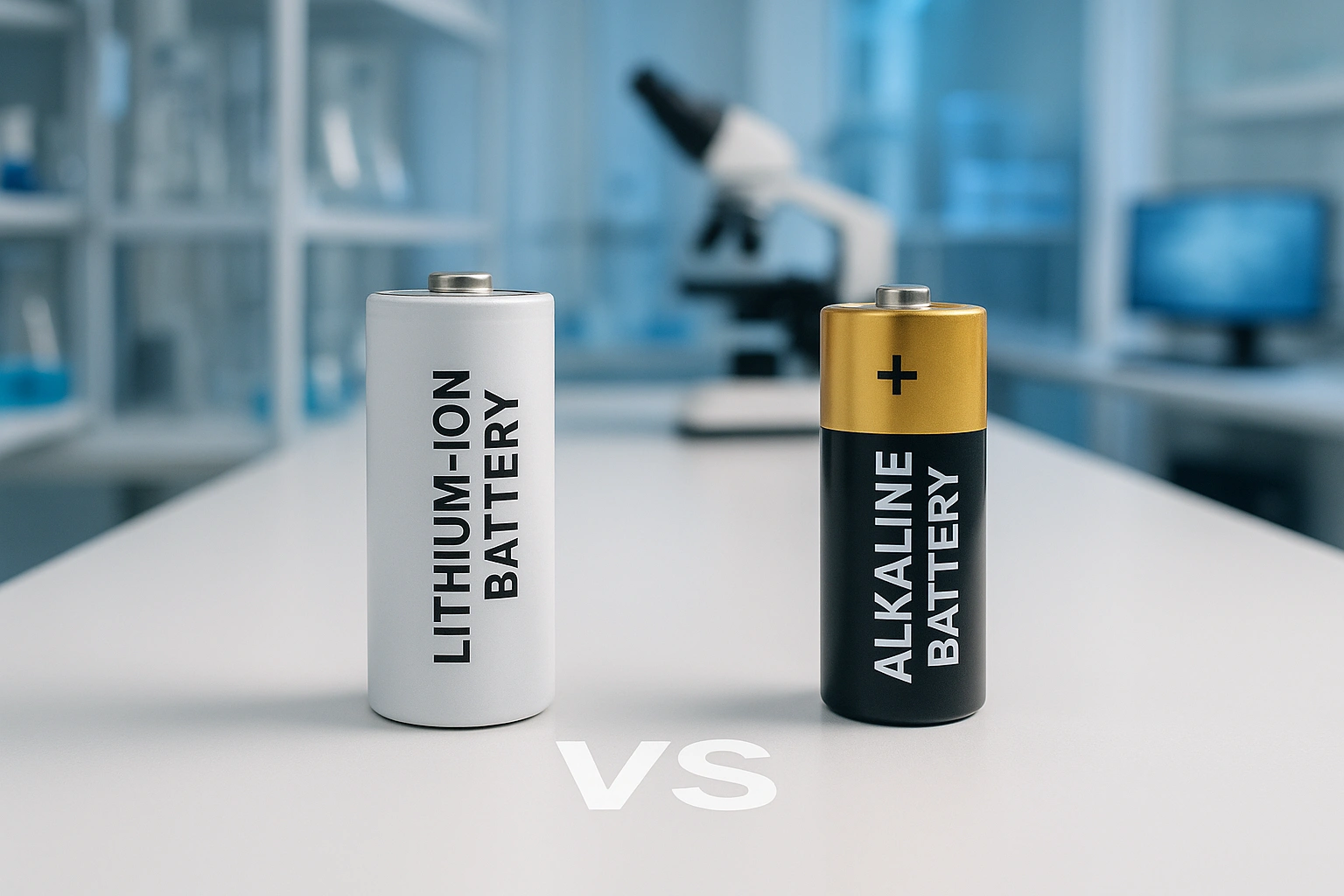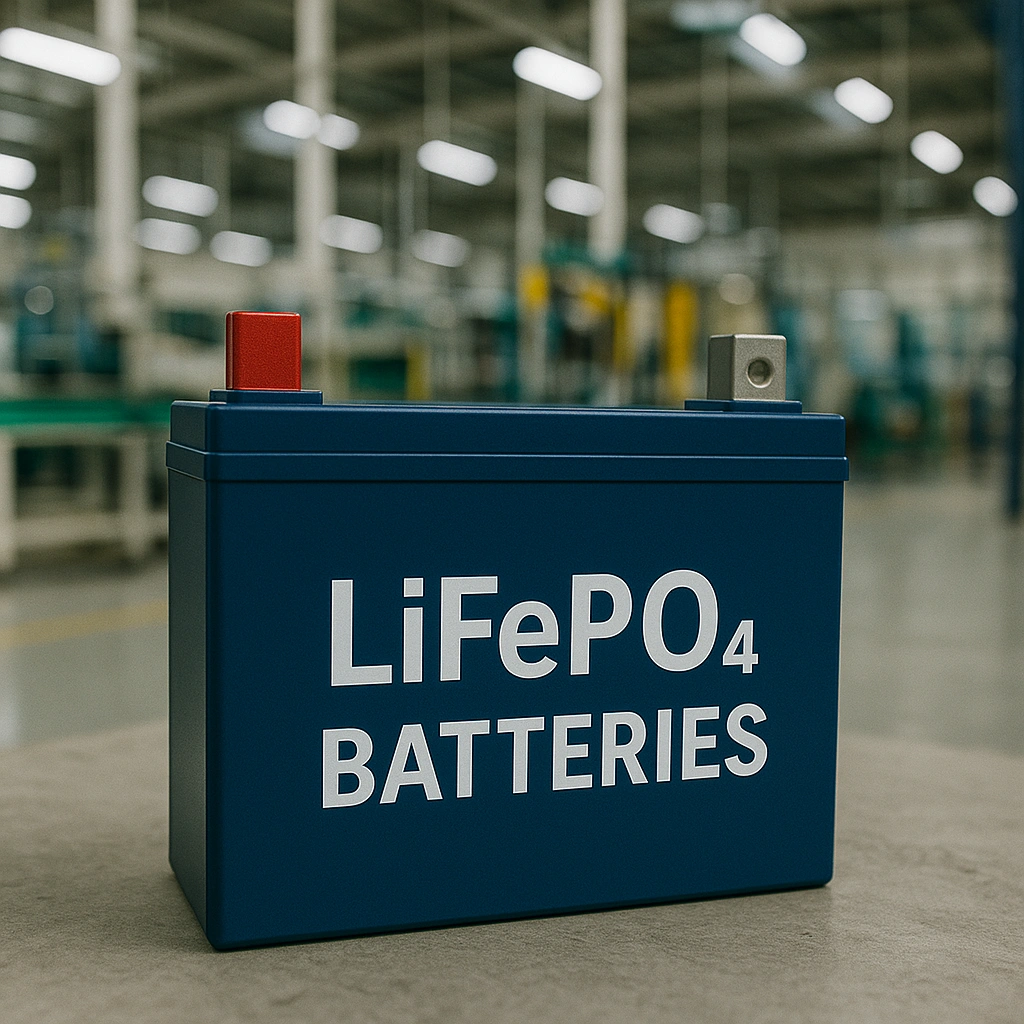Lithium-ion Battery vs Alkaline – Key Differences Explained
Intro: Choosing the Right Battery for Your Application
When selecting a battery for your device or system, understanding the differences between lithium-ion and alkaline batteries is crucial. Alkaline batteries are widely available and inexpensive, while lithium-ion batteries are rechargeable and longer-lasting. But which is better for your use case? This article compares their structure, performance, cost, and ideal applications to help you decide.
Appearance – Lithium-ion vs Alkaline Battery
| Feature | Alkaline Battery | Lithium-ion Battery |
|---|---|---|
| Shape | Cylindrical (AA, AAA) | Cylindrical, prismatic, pouch |
| Labeling | “Alkaline”, “1.5V” | “Li-ion”, “3.6V / 3.7V” |
| Voltage (per cell) | 1.5V (non-rechargeable) | 3.6V–3.7V (rechargeable) |
| Rechargeable? | No | Yes |
| Weight | Usually heavier at low capacity | Lighter for same energy |
Lithium-ion cells can sometimes resemble AA batteries (e.g., 14500 size), but their voltage and chemistry are entirely different.
What Are the Advantages of Lithium-ion Batteries?
-
Rechargeable: Can be cycled 1000–3000+ times
-
High energy density: More power in a smaller form factor
-
Low self-discharge rate: Retains charge longer during storage
-
Consistent voltage output: Performs better under load
-
Environmentally friendlier: Fewer disposals = less waste
These advantages make lithium-ion batteries ideal for electronics, energy storage, power tools, and electric vehicles.
What Are the Disadvantages of Alkaline Batteries?
-
Single-use: Not rechargeable, adding long-term cost and waste
-
High self-discharge under load: Voltage drops quickly in high-drain devices
-
Leakage risk: May leak over time, especially when discharged
-
Inconsistent performance in cold environments
Alkaline batteries are better suited for low-power, short-term applications like TV remotes, clocks, or flashlights.
Is Lithium Battery Better Than Alkaline?
Yes—in most use cases, lithium-ion batteries are superior:
| Feature | Alkaline | Lithium-ion |
|---|---|---|
| Rechargeable | No | Yes |
| Energy density | Lower | Higher |
| Lifetime cost | Higher over time | Lower (despite higher upfront) |
| Output stability | Decreases quickly | Maintains steady voltage |
| Performance in cold | Weak | Strong |
Why Are Lithium Batteries So Much Better?
Because they combine:
-
High power output
-
Longer service life
-
Compact size
-
Chargeability
-
Greater thermal range
Lithium batteries can handle high-drain devices and demanding environments with much better efficiency than alkaline cells.
How to Tell If a Battery Is Alkaline or Lithium
Look for:
-
Labeling: “Alkaline” vs. “Li-ion” or “Lithium”
-
Voltage: Alkaline = 1.5V; Li-ion = 3.6V–3.7V
-
Rechargeability: Lithium-ion is always rechargeable
-
Size code: 14500 (Li-ion) vs. AA (Alkaline) – same size, different chemistry
⚠️ Important: Never mix or substitute lithium and alkaline batteries in the same device.
Can I Replace AA Alkaline Batteries with Lithium?
Not directly—only if the replacement lithium battery is designed to match:
-
Voltage: Must be 1.5V lithium primary (non-rechargeable), not 3.7V Li-ion
-
Form factor: AA-sized lithium batteries exist but must match the device’s power specs
-
Rechargeability: Rechargeable Li-ion cells (14500) cannot be used in devices meant for 1.5V unless regulated
If using rechargeables, choose LiFePO₄ 1.5V lithium batteries designed to replace alkalines.
How Much Longer Do Alkaline Batteries Last?
Alkaline batteries last:
-
Up to 5–10 years in storage (low self-discharge)
-
Only a few hours/days in high-drain devices
-
Drop voltage sharply under heavy load
Their lifespan is heavily dependent on the type of device used.
What Is the Lifespan of a Lithium-ion Battery?
Lithium-ion batteries typically last:
-
500–3000+ charge cycles, depending on quality and usage
-
3–10 years in active service
-
Retain >80% capacity even after 1000 cycles (for quality brands)
This makes them significantly more cost-effective for long-term or intensive applications.
Which Lasts Longer – Alkaline or Lithium?
Lithium-ion batteries last longer, both in terms of:
-
Daily runtime (more energy per cell)
-
Total usable life (years vs. hours)
-
Charge cycles (reusable vs. disposable)
Even lithium primary (non-rechargeable) batteries outperform alkaline in cold weather and high-drain devices.
Conclusion: Choose Lithium-ion for Long-Term Performance
Alkaline batteries are inexpensive and convenient for one-time use, but lithium-ion batteries provide better performance, longer lifespan, and rechargeability.
For devices that require high power, long usage, or frequent replacement, lithium-ion batteries are the smarter and more sustainable option.
For OEMs and commercial applications, PKNERGY offers custom lithium battery solutions that outperform traditional alkaline cells in both cost and reliability.




